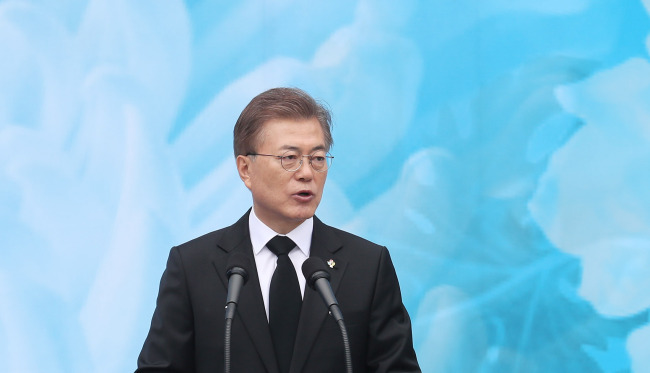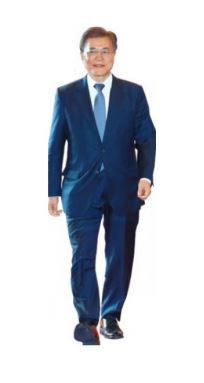Moon's first month: Missiles, reform and making extraordinary ordinary moves
By Korea HeraldPublished : June 9, 2017 - 17:12
President Moon Jae-in’s first month in office has been marked by reform, change and taking ordinary but significant actions.
As promised in his campaign, Moon has made himself more approachable and his office more communicative than the previous administration. The changes Moon had in mind were visible from his inauguration speech on May 10, which he kept short and much less formal than his predecessors.
As promised in his campaign, Moon has made himself more approachable and his office more communicative than the previous administration. The changes Moon had in mind were visible from his inauguration speech on May 10, which he kept short and much less formal than his predecessors.

During the past month, Cheong Wa Dae briefed the media on 65 occasions, three of which were conducted by the president himself.
One such occasion was on May 19 when Moon announced the nomination of Kim Yi-soo as the head of the Constitutional Court. In making the announcement, Moon did the unthinkable -- he took questions from the media.
Moon’s nominations, whether deemed acceptable by opposition parties or not, have one thing in common, in that many of them have been taken as “extraordinary.”
For the all-powerful position of civil affairs secretary, Moon picked liberal scholar Cho Kuk instead of former prosecutors as his two predecessors had done. For his economy advisor, he chose Chang Ha-sung, a key associate of his rival Ahn Cheol-soo of the People’s Party. Moon also appointed a woman to lead the Ministry of Patriots and Veterans Affairs -- retired Army lieutenant colonel Pi Woo-jin who made a name for herself by standing up for the equal treatment of women in the military. Moon’s foreign minister nominee Kang Kyung-hwa is another example of “extraordinary” personnel choice, in that she is a woman, and did not follow the elite course within the diplomatic corps.
Moon’s actions in more mundane matters have also made headlines, one example being when he declined the help of an aide in removing his jacket.
While such an action would be considered the norm in many developed nations, the president removing his own jacket made big headlines here, with the media taking it as a symbol of his anti-authoritarian approach.
Such actions appear to have won over the public. According to a Gallup poll released Friday, 82 percent of the public approve of Moon. In comparison, former President Park Geun-hye’s approval rating stood at 44 percent about a month into her presidency. The figures for former presidents Lee Myung-bak, Roh Moo-hyun and Kim Dae-jung came to 52 percent, 60 percent and 71 percent at about the same time during their terms.
The situation in the political arena, however, is very different.
Holding 120 of the 299 National Assembly seats, the ruling Democratic Party of Korea lacks the clout to push through changes Moon seeks without the cooperation of the opposition parties.
The main opposition Liberty Korea Party, which holds 107 seats, is already flexing its muscles promising to become a “strong opposition” to keep the administration in check. The party, formed on the foundations of Park Geun-hye’s Saenuri Party, has taken issue with almost all of Moon’s nominations, and has promised to prevent the supplementary budget from being approved.
Missiles and missiles
On the foreign relations front, Moon‘s first month on the job has been marked by a rapid succession of provocations from North Korea.
While Moon hopes to engage North Korea, Pyongyang is moving in the opposite direction, becoming even more provocative than before. Since Moon took office, North Korea has launched various types of missiles on four separate occasions.

Despite the provocations, the South Korean government and the legislature are moving to thaw inter-Korean relations. The country’s political parties have agreed to push for a reunion of families separated by the Korean War, while the Ministry of Unification is taking a softer approach to civilian requests for permission to make contact with North Korean entities.
Following the latest missile launch on Thursday, Moon reiterated his two-pronged strategy of combining dialogue with sanctions to rein in North Korea.
“If North Korea shows its will to denuclearize, (South Korea) will lead the way for (Pyongyang) to receive international support and cooperation,” Moon said at the National Security Council meeting on Thursday saying that his government will engage North Korea while upholding sanctions to bring about denuclearization.
He also called on the ministries concerned with diplomacy and national security to take steps against the provocations, and for the military to maintain readiness.
The US Terminal High Altitude Area Defense missile has also become a major issue for the Moon administration. While Moon has taken issue with its deployment here, the trouble came from an unexpected corner.
The Ministry of National Defense was found to have deliberately withheld information about the four THAAD launchers at a US military base in South Korea. The probe that followed revealed that former Deputy Minister for Defense Policy Wee Seung-ho, an Army lieutenant general, ordered related information to be withheld.
The probe also revealed that the Defense Ministry designed the handover of the land for THAAD deployment to bypass a full environmental impact study.
Wee, who was once considered a strong candidate for a top military post, has been reassigned to a research post and the government plans to launch a full environmental study that could delay the THAAD deployment for a year or more.
By Choi He-suk (cheesuk@heraldcorp.com)
-
Articles by Korea Herald








![[KH Explains] Hyundai's full hybrid edge to pay off amid slow transition to pure EVs](http://res.heraldm.com/phpwas/restmb_idxmake.php?idx=644&simg=/content/image/2024/04/18/20240418050645_0.jpg&u=20240419100350)







![[From the Scene] Monks, Buddhists hail return of remains of Buddhas](http://res.heraldm.com/phpwas/restmb_idxmake.php?idx=652&simg=/content/image/2024/04/19/20240419050617_0.jpg&u=20240419175937)

![[KH Explains] Hyundai's full hybrid edge to pay off amid slow transition to pure EVs](http://res.heraldm.com/phpwas/restmb_idxmake.php?idx=652&simg=/content/image/2024/04/18/20240418050645_0.jpg&u=20240419100350)

![[Today’s K-pop] Illit drops debut single remix](http://res.heraldm.com/phpwas/restmb_idxmake.php?idx=642&simg=/content/image/2024/04/19/20240419050612_0.jpg&u=)